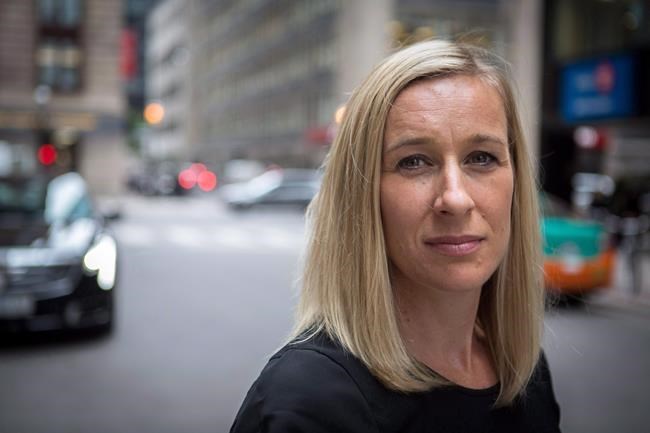OTTAWA — Former Olympic skier Allison Forsyth told a parliamentary committee that Canada's safe sport crisis will continue "unless we do something big."
Forsyth was among witnesses appearing Thursday before a Heritage standing committee that's held a series of hearings on safe sport in Canada since last year.
Forsyth works in the field of safe sport, but also introduced herself as a survivor of "egregious sexual abuse within our Canadian sport system."
Ski coach Bertrand Charest wasn't convicted of assaulting Forsyth, but he served 57 months in jail for sexual assault of other athletes, including minors, under his care in the 1990s.
He was granted parole in 2020.
Forsyth has said Alpine Canada ignored her complaints about the coach's behaviour while she was competing.
"The reality is that our sport system has for decades been accepting of and conducive to maltreatment and abuse," said the 44-year-old from Nanaimo, B.C.
"Cases are coming in and courageous survivors are coming forward faster than we can educate and put safeguarding hiring measures in place. Coaches are becoming fearful of coaching and officials, we are losing them on a daily basis."
A wave of athlete complaints of maltreatment and abuse that gained speed coming out of the 2022 Olympic Games in Beijing further accelerated last summer in large part because of Hockey Canada.
A furor erupted when news of how Hockey Canada handled alleged sexual assaults became public.
The federal Heritage and Status of Women committees have held hearings and heard from tearful athletes across the sports of gymnastics, soccer, track and field, water polo, cycling and boxing.
The heads of national sports organizations, including Hockey Canada, as well as federal sports minister Pascale St-Onge and new sport integrity officer Sarah-Eve Pelletier have been grilled by members of Parliament in these hearings.
Fencing will be another next sport called onto the carpet.
Heritage committee MPs voted Thursday in favour of a motion to summon the Canadian Fencing Federation's board of directors and for them to produce financial records and minutes from the last five years.
While Forsyth spoke to the Status of Women committee in December about her experience as an athlete, her knowledge from working in the field of safe sport field was sought Thursday.
"Progress has been far too slow," she said. "We have seen a few organizations step up and embrace safe sport.
"But unfortunately, we have also seen way too many others only put in safe-sport programming because they had to do so as a condition to receive funding. And we've seen organizations putting in only the minimum standards to tick the box and then move on."
Forsyth says having a safe-sport policy and an online training module isn't enough in minor sport.
She's ITP Sport's chief executive officer and works with sports organizations to educate leaders and athletes, and assess sport environments.
ITP is also assigned the handling and processing of complaints.
Alias Solution does the same work for 90 sport organizations in Quebec.
President Vicky Poirier and vice-president Danny Weill told the committee Alias has received 500 complaints since February 2021, with 12 per cent involving sexual abuse.
There have been calls for a judicial inquiry into Canadian sport, but there was disagreement on that subject Thursday.
"A judicial inquiry is a powerful mechanism to reveal truth to engage accountability and transparency in government and other public institutions that receive funding," said Concordia University of Edmonton assistant professor Teresa Fowler.
"Sport is unhealthy. I think we can all agree that's why we're all here. That's why all this time and energy is happening."
But the University of Toronto's Gretchen Kerr believes a judicial inquiry will eat up precious time needed to implement change in the sport system.
"We'll lose time and money and we'll lose progress," Kerr stated. "We have all the information we need to move forward."
Kerr's U of T colleague Bruce Kidd, an Olympic runner in 1964, says he's seen the most progress on safe sport in the last four years than at any time in his 60 years as an athlete, researcher, athletic director and chair of many sports bodies.
"Progress can be reversed," he said.
There needs to be an aggressive campaign for the adoption of the universal code of conduct to prevent and address maltreatment of sport, and a mass sign-on to the new office of the sports integrity commissioner (OSIC), Kidd said.
Randall Gumbley, a consultant for the World Association of Icehockey Players Unions, said OSIC could be a benefit for major junior hockey players in the CHL, but says the CHL operates as a pro league.
"The CHL operates in a vacuum," he said. "They don't fall under the NSO, Hockey Canada. They're a pro league. The NSO and the federal government isn't able to enforce any laws with the CHL.
"There would have to be some governance changes within the policies of the federal government, the NSO, to bring the CHL under that umbrella."
This report by The Canadian Press was first published March 23, 2023.
The Canadian Press



